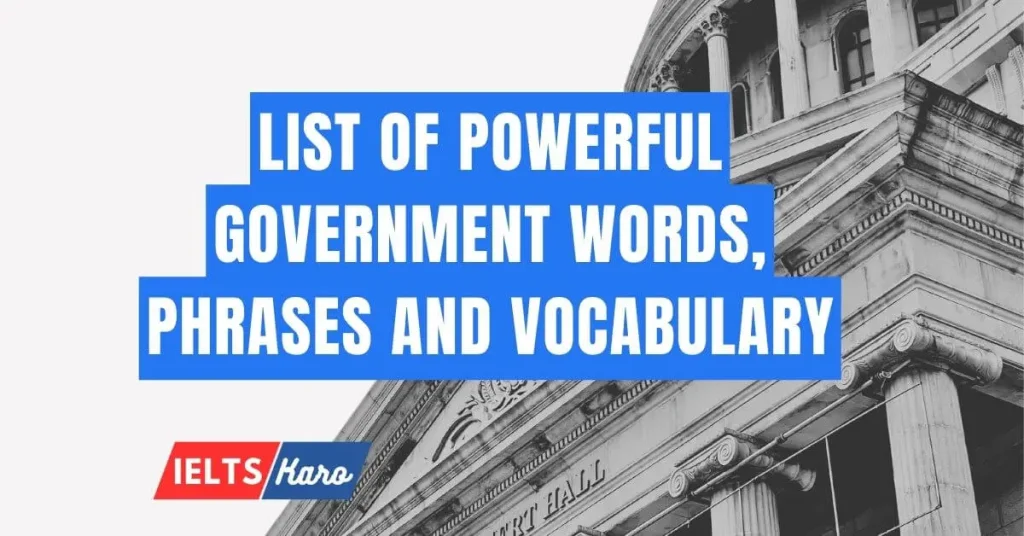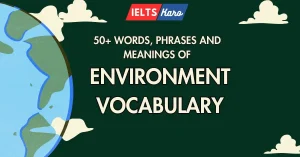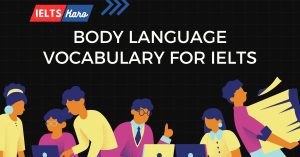Here is a list of words and phrases to boost your Government Vocabulary for IELTS
Politics is something that usually isn’t covered in IELTS. However, topics relevant to government policies are quite common in Task 1, Task 2, and Reading modules. I am happy to share the following list to help you get the most out of vocabulary relevant to government policies.
Words with Meanings – Definition and Examples
Preparing for the IELTS exam involves understanding and using a range of vocabulary effectively across the reading, writing, and speaking modules. In this article, we’ll explore government-related vocabulary, which is commonly tested in these modules. We’ll cover key words and phrases, their meanings, and usage in sentences to help you excel in your IELTS exam.
Key Government Vocabulary for IELTS
General Terms
Government – The group of people with the authority to govern a country or state; a particular ministry in office.
- Sentence: The government has introduced new policies to combat climate change.
Administration – The process or activity of running a business, organization, etc.; the officials in the executive branch of a government.
- Sentence: The current administration is focusing on healthcare reform.
Policy – A course or principle of action adopted or proposed by an organization or individual.
- Sentence: The government’s policy on education has received mixed reviews.
Legislation – Laws, considered collectively.
- Sentence: New legislation has been passed to improve road safety.
Regulation – A rule or directive made and maintained by an authority.
- Sentence: The government has introduced new regulations for financial institutions.
Republic – A country with an elected leader and no monarchy
- Sentence: The type of governance in Pakistan is an Islamic Republic.
Dictatorship – An authoritative rule and control of one non-elected person on a country, that uses force to retain control
- Sentence: Pakistan has seen its fair share of dictatorship governments in the past.
Constitutional Government – A government that follows the constitution.
- Sentence: We do not have a constitutional government in Pakistan since 2022.
Specific Terms
Bureaucracy – A system of government in which most of the important decisions are made by state officials rather than by elected representatives.
- Sentence: The bureaucracy is often criticized for being slow and inefficient.
Democracy – A system of government by the whole population or all the eligible members of a state, typically through elected representatives.
- Sentence: In a democracy, citizens have the right to vote for their leaders.
Autocracy – A system of government by one person with absolute power.
- Sentence: Many people fled the country to escape the autocracy.
Federalism – A system of government in which entities such as states or provinces share power with a national government.
- Sentence: Federalism allows for diverse policies in different states while maintaining national unity.
Parliament – The highest legislative authority in a country.
- Sentence: The new bill will be debated in parliament next week.
Communist – A system of government where all businesses are owned by the public sector (the government) and there is no system of classes.
- Sentence: Communist governments failed miserably in the past because of inefficient resource allocation.
Politicians – A member of opposition or the ruling party holding an office in the government.
- Politicians can often divide our society to disrupt peace and order.
Advanced Terms
Constitution – A body of fundamental principles or established precedents according to which a state or other organization is acknowledged to be governed.
- Sentence: The constitution guarantees the rights and freedoms of all citizens.
Sovereignty – Supreme power or authority.
- Sentence: The country declared its sovereignty after gaining independence.
Diplomacy – The profession, activity, or skill of managing international relations.
- Sentence: Diplomacy is crucial for maintaining peaceful relations between countries.
Impeachment – A charge of misconduct made against the holder of a public office.
- Sentence: The president faced impeachment for alleged corruption.
Referendum – A general vote by the electorate on a single political question.
- Sentence: The referendum will decide whether the country should remain in the union.
Usage in IELTS Modules
Reading Module
In the reading module, you’ll encounter passages that may discuss government systems, policies, and international relations. Familiarizing yourself with the vocabulary above will help you understand the texts more easily and answer questions accurately.
Example Passage:
“The government’s new environmental policy aims to reduce carbon emissions by 40% over the next decade. This legislation has faced opposition from various sectors, but the administration remains committed to its implementation.”
Example Question:
What is the main goal of the government’s new environmental policy?
- To reduce carbon emissions by 40% over the next decade.
Writing Module
In the writing module, particularly in Task 2, you might be asked to write an essay on topics related to government actions, policies, or political systems. Using the appropriate vocabulary will enhance the clarity and sophistication of your essay.
Example Essay Prompt:
“Some people believe that the government should be responsible for providing free healthcare to all citizens. To what extent do you agree or disagree?”
Example Response:
“I believe that the government should indeed be responsible for providing free healthcare to all citizens. Firstly, it is a fundamental policy that ensures equal access to medical services, regardless of an individual’s financial status. Furthermore, such legislation can lead to a healthier population, reducing the overall burden on the healthcare system in the long run.”
Speaking Module
In the speaking module, you might be asked questions about your opinions on government policies, your country’s political system, or international relations. Using relevant vocabulary confidently will help you express your ideas more clearly.
Example Questions and Responses – Speaking Part 1
Can you describe the political system in your country?
The government plays a crucial role in addressing climate change by implementing policies and regulations that limit carbon emissions and promote renewable energy sources.
Are you worried about climate change?
My country has a democratic system where citizens elect representatives to parliament. The government is divided into three branches: the executive, the legislature, and the judiciary, each with its own distinct powers.
How important is diplomacy in maintaining international relations?
Diplomacy is extremely important in maintaining international relations as it helps resolve conflicts, promotes mutual understanding, and fosters cooperation between countries.
Example Questions and Responses – Speaking Part 2
“Describe a government policy that has had a significant impact on your country. You should say:
- what the policy is
- when it was introduced
- what the impact of this policy has been
- and explain why you think this policy is important.”
Sample Response
“One significant government policy that has had a profound impact on my country is the Qoumi Sehat Card, introduced in 2018 by the government of Pakistan Tehreek e Insaaf. This policy aimed to provide universal healthcare coverage to all citizens, ensuring that everyone had access to essential medical services regardless of their financial situation.
Before this policy was implemented, many people in my country struggled to get access to affordable healthcare. The government recognized this issue and decided to take a bold step to address it by enacting the Universal Sehat Card.
I have personally used this card to get free medical services like minor surgery and doctor visits at designated private and government hospitals. It greatly removed the financial barriers of affordability for basic healthcare.
The impact of this policy has been substantial and multifaceted. Firstly, it has drastically reduced the number of uninsured individuals. This means that millions of people who previously had no access to healthcare services are now covered. Secondly, it has improved public health outcomes significantly. For instance, there has been a noticeable decrease in preventable diseases and an increase in life expectancy.
Additionally, the policy has had a positive economic impact. By making healthcare accessible to everyone, it has alleviated the financial strain on families who previously had to choose between healthcare and other necessities.
I believe this policy is crucial for several reasons. It demonstrates the government’s commitment to improving the quality of life for its people, highlighting the importance of social welfare policies. Moreover, it sets a precedent for future reforms in other areas, such as education and housing, showing that comprehensive and inclusive policies can lead to significant positive changes in society.
In conclusion, the Qoumi Sehat Card initiative is a landmark policy that has not only improved the health and well-being of the population but also strengthened the social and economic fabric of the country.”
Using government-related vocabulary effectively in the IELTS exam requires strategic practice and awareness of context. Here are some tips on how to incorporate this vocabulary into your responses across the different IELTS modules:
Reading Module
- Context Clues: When you encounter unfamiliar government-related terms, use context clues from the surrounding text to infer meanings. Look for definitions or explanations that might be provided in the passage.
- Practice Skimming and Scanning: Develop your ability to quickly locate and understand key terms in a passage. Highlight or underline government-related vocabulary as you read to reinforce recognition.
- Expand Your Reading: Regularly read articles, essays, and reports on government and politics from reputable sources to become familiar with common terms and their usage.
Writing Module
- Plan Your Essays: Before you start writing, plan your essay and think about how you can incorporate relevant vocabulary. Make a list of key terms you want to use.
- Synonyms and Paraphrasing: Use synonyms to avoid repetition and show your range of vocabulary. For example, instead of repeatedly using “government,” you can use “administration,” “authorities,” or “regime.”
- Complex Sentences: Use complex sentences to incorporate advanced vocabulary naturally. For instance, “The government’s recent legislation, aimed at reducing pollution, has sparked significant debate among policymakers.”
- Practice Essays: Write practice essays on topics related to government and politics. Review your essays to ensure you are using the vocabulary correctly and effectively.
Speaking Module
- Practice Common Topics: Familiarize yourself with common IELTS speaking topics related to government, such as policies, political systems, and international relations. Prepare responses that include key vocabulary.
- Use Examples: When answering questions, provide examples that naturally incorporate government-related terms. For example, “In my country, the government’s policy on education has led to significant improvements in literacy rates.”
- Speak Naturally: Ensure that your use of vocabulary sounds natural. Avoid forcing complex terms into your speech if they don’t fit the context.
- Record and Review: Practice speaking on government-related topics and record yourself. Review the recordings to check your use of vocabulary and make adjustments as needed.
Listening Module
- Active Listening: Pay attention to how native speakers use government-related terms in lectures, news reports, and discussions. Note the context and usage.
- Practice Listening Exercises: Use IELTS listening practice materials that cover topics related to government and politics. Familiarize yourself with the accent, pace, and intonation of native speakers discussing these topics.
- Vocabulary Lists: Create lists of government-related terms you hear in listening exercises and practice their meanings and usage.
General Tips
- Flashcards: Create flashcards with government-related vocabulary on one side and their definitions and example sentences on the other. Review these regularly.
- Group Study: Practice with a study group where you discuss government-related topics and provide feedback on each other’s use of vocabulary.
- Engage with Content: Watch documentaries, listen to podcasts, and read books on government and politics. This will help you see how these terms are used in different contexts and improve your overall comprehension.
By consistently practicing and integrating these tips into your study routine, you’ll be better prepared to use government-related vocabulary effectively in the IELTS exam.
Visit Vocabulary.com for more words on government and politics.
Conclusion
Mastering government-related vocabulary is essential for achieving a high score on the IELTS exam. By understanding and practicing the usage of these words and phrases, you’ll be better prepared to tackle the reading, writing, and speaking modules with confidence. Remember to incorporate these terms naturally into your responses and essays to demonstrate your proficiency in English and your understanding of governmental concepts.





